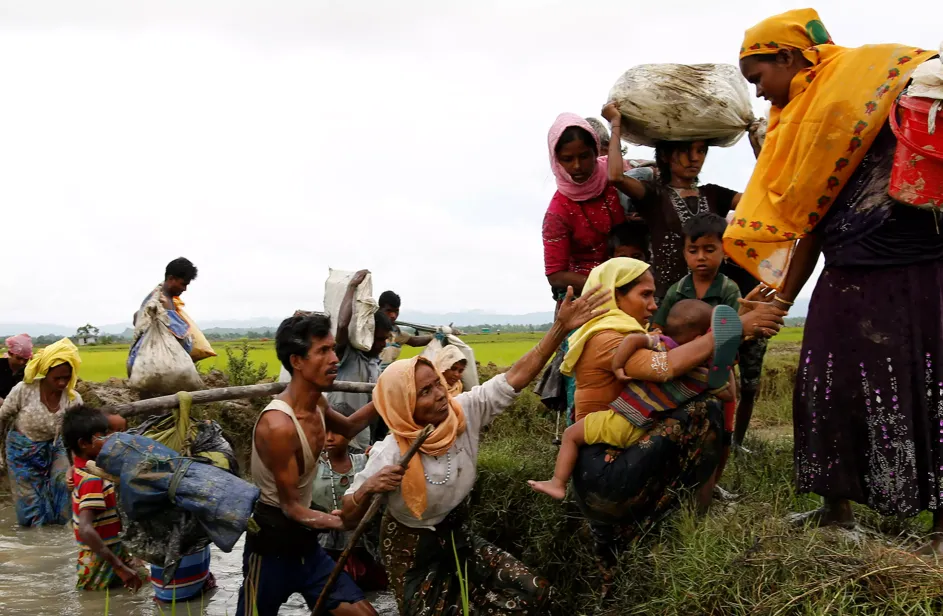-
CENTRES
Progammes & Centres
Location
While Myanmar bears the responsibility for safeguarding the rights of the Rohingyas, collective efforts are essential to reach a just resolution to the Rohingya crisis

On 8 June, demonstrations across the sprawling camps in Cox’s Bazar District vividly illustrate the desperation of the displaced Rohingyas marooned in Bangladesh for nearly the past six years. Displaced people, consisting of both young and old, chanted slogans and waved placards written, “No more refugee life. No verification. No scrutiny. No interview. We want quick repatriation through the UNHCR data card. We want to go back to our motherland,”. “Let's return to Myanmar. Don't try to stop repatriation.”
It is worth noting that these individuals are not officially recognised as refugees because Bangladesh is not a signatory to the 1951 Convention or its 1967 Refugee Protocol. Instead, they are called Forcibly Displaced Myanmar Nationals (FDMNs) which restricts them from receiving specific rights and protection that are afforded to a refugee. However, the Bangladesh government has been making significant efforts to support and care for this population residing within its borders, despite facing significant financial and spatial challenges.
Amidst various conflicts and crises worldwide, such as the Russia-Ukraine conflict, international support for the Rohingya people is diminishing.
Amidst various conflicts and crises worldwide, such as the Russia-Ukraine conflict, international support for the Rohingya people is diminishing. At the beginning of June 2023, the World Food Programme (WFP) announced a reduction in aid for the displaced Rohingya in Bangladesh, lowering the monthly assistance from US $10 to US $8 per person. While the government of Japan donated US $4.4 million to WFP last week, an additional US $48 million is required to meet ration needs.
Additionally, the UNHCR and its partners have appealed for US $876 million this year, highlighting the urgent need for assistance. They have warned that nearly half of the Rohingya families are not receiving an adequate diet due to reduced rations, leading to widespread malnutrition, particularly among women and children. Unfortunately, only 28 percent of the required funding has been received thus far.
Amidst challenging conditions in Bangladesh, a significant development has occurred regarding the Rohingya crisis. A bilateral agreement between Bangladesh and Myanmar, facilitated by China, has been reached to repatriate the Rohingyas to Myanmar. However, many analysts have raised concerns about the motivations behind Myanmar's actions. It seems the Junta aims to demonstrate efforts to integrate the Rohingya population into their society before the upcoming August International Court of Justice (ICJ) hearing. Some see this move as an attempt by Myanmar to improve its image and address the accusations of human rights violations.
The issue of repatriating the Rohingyas from the camps in Bangladesh to Myanmar is a profoundly complex and multifaceted question. It requires a careful analysis of various factors, including Myanmar's conditions, the Rohingya population's rights and safety, and the international community's role in facilitating a just and sustainable solution.
The repatriation plan drafted by the Myanmar government designates 15 villages to receive the displaced people from Bangladesh. The government will keep returnees at the Hla Poe Kaung transit camp for a maximum of two months. Afterwards, the authorities will relocate them to one of two resettlement camps, where they have built prefabricated houses.
Additionally, Myanmar authorities would deploy security personnel to uphold “the rule of law and security in the areas where the returnees reside or pass through." They have repeatedly cited “security concerns” as the justification for restricting the rights of the Rohingya to travel beyond their camps and villages in Rakhine State.
On 15 March, a delegation of 17 members from Myanmar arrived in Bangladesh to verify the information regarding the Rohingyas listed for repatriation. According to the plan, initially, Myanmar will take 1,140 Rohingyas. After thoroughly examining the details, they have shortlisted initially 480 Rohingyas for the repatriation pilot project. Subsequently, on 5 May, a group of 27 individuals, including 20 Rohingyas, visited Myanmar's Rakhine State to assess the environment’s suitability for repatriation. The delegation evaluated the conditions and circumstances there.
During the visit of the Rohingya delegation, they inspected the Hla Poe Kaung transit camp and Kyein Chaung resettlement camp located in the Maungdaw township of Rakhine State. The camps were situated on land previously owned by the Rohingyas and were destroyed by Myanmar security forces. The transit camp is enclosed by perimeter fencing topped with barbed wire. It features security outposts reminiscent of the confinement experienced in the Rohingya detention camps in Sittwe and other townships in central Rakhine State. This plan raises questions about Myanmar's intent to genuinely integrate the Rohingya into society rather than merely shifting them from one camp to another.
Any repatriation plan must consider the prospects for their integration, access to fundamental rights, and the restoration of their dignity in Myanmar.
Another point is the inclusion of National Verification Cards (NVCs). The displaced Rohingyas have consistently expressed their desire to return home, with the condition that their safety, access to land and livelihoods, freedom of movement, and citizenship rights are guaranteed.
The NVCs do not grant Myanmar citizenship, and the Rohingya community has overwhelmingly rejected the NVC’s process in 2019, as they view it as a means of categorising them as foreigners in their own country. NVC holders have been denied significant freedom of movement, and the process itself has been characterised by threats and coercion to compel Rohingya individuals to accept the cards.
Furthermore, the ongoing political instability and human rights concerns in Myanmar raise significant doubts about the safety and well-being of the returnees. Since the coup in 2021, the Myanmar security forces have arrested numerous Rohingya individuals, including men, women, and children, on charges of “unauthorised travel.”
Since the coup, only some shelters have received any repairs over the past two years. Additional restrictions on movement, facilities for health, and aid blockages in Rohingya camps and villages exacerbate water scarcity and food shortages leading to the deteriorating health of the Rohingyas. The recent cyclone Mocha further compounds the challenges, as the Junta impedes disaster response efforts, leaving shelters destroyed and basic facilities suspended.
The Rohingyas have faced systematic persecution and discrimination for years, resulting in forced displacement. Any repatriation plan must consider the prospects for their integration, access to fundamental rights, and the restoration of their dignity in Myanmar. Comprehensive efforts to address the root causes of the conflict and establish an inclusive and tolerant society that respects the rights of all ethnic and religious groups will be essential. However, such intent is lacking.
While the Government of Myanmar bears the responsibility and accountability for safeguarding the rights of the Rohingya population, collective efforts are essential for reaching a just and lasting resolution to the Rohingya crisis.
Sreeparna Banerjee is a Junior Fellow at Observer Research Foundation.
The views expressed above belong to the author(s). ORF research and analyses now available on Telegram! Click here to access our curated content — blogs, longforms and interviews.

Sreeparna Banerjee is an Associate Fellow in the Strategic Studies Programme. Her work focuses on the geopolitical and strategic affairs concerning two Southeast Asian countries, namely ...
Read More +